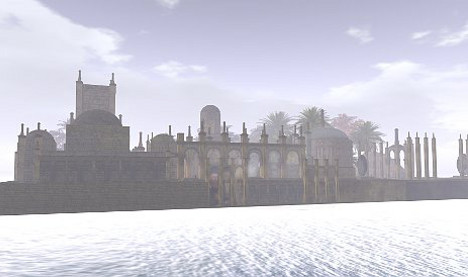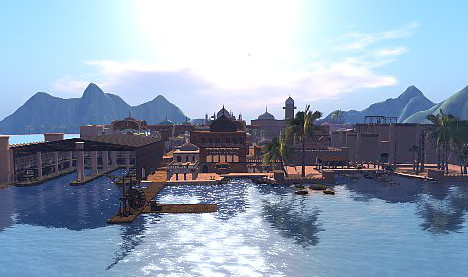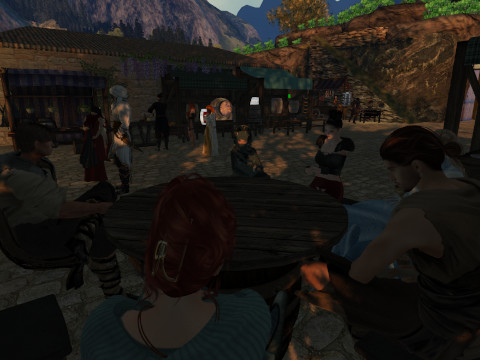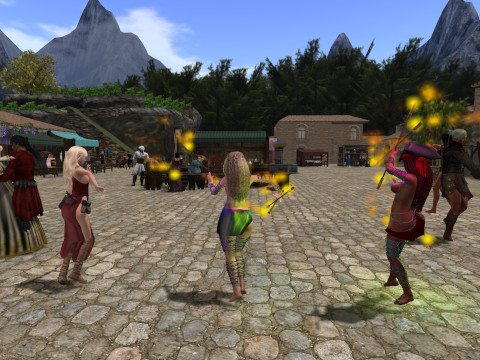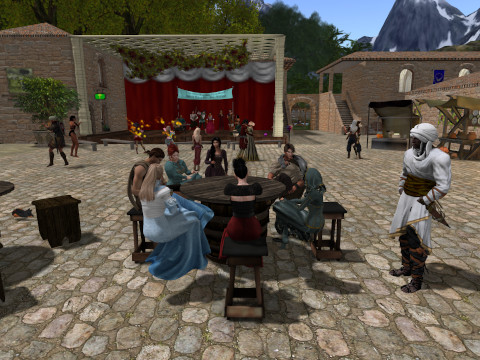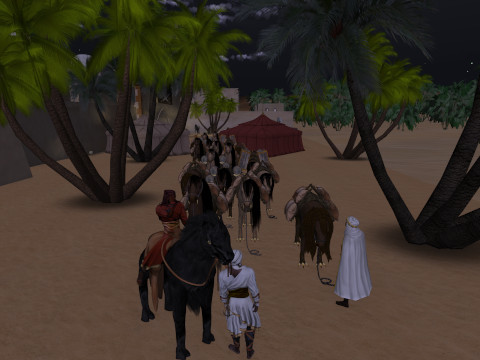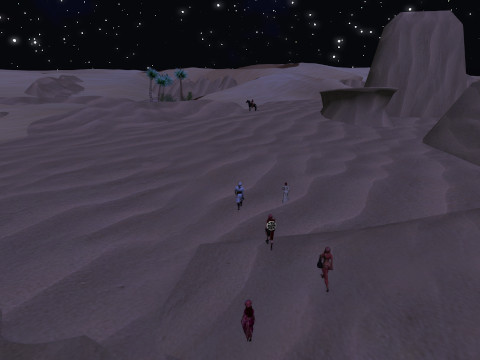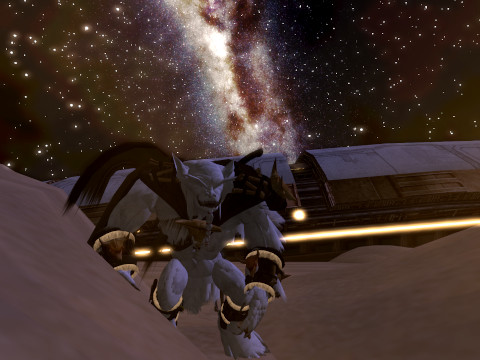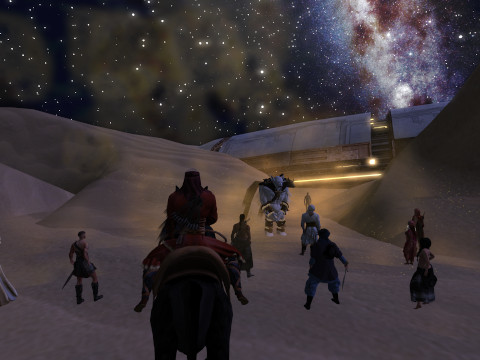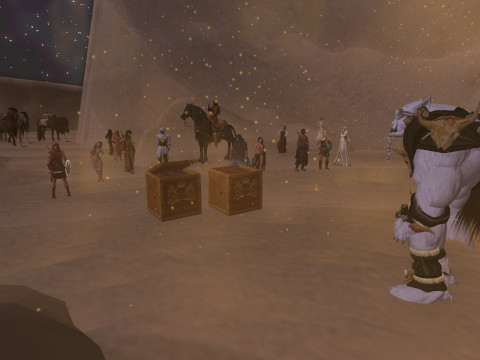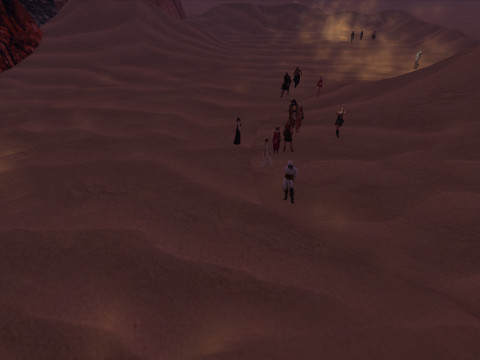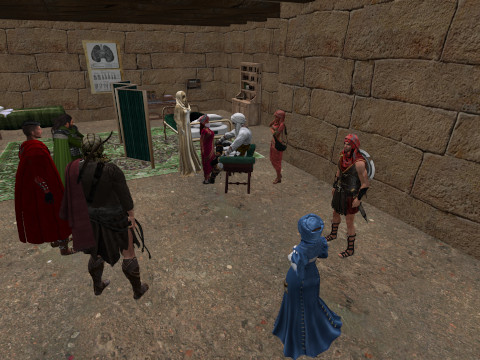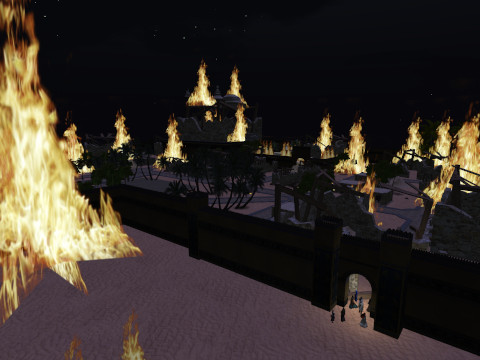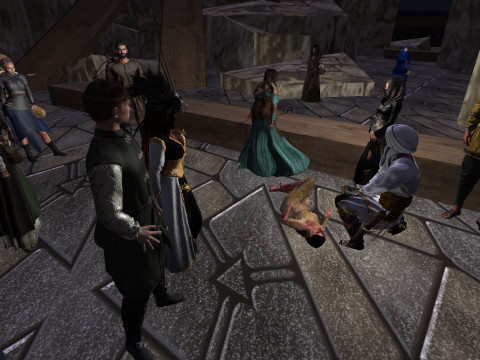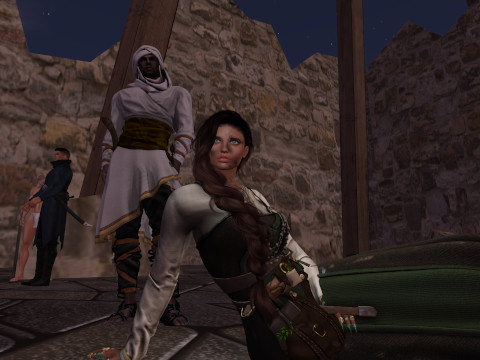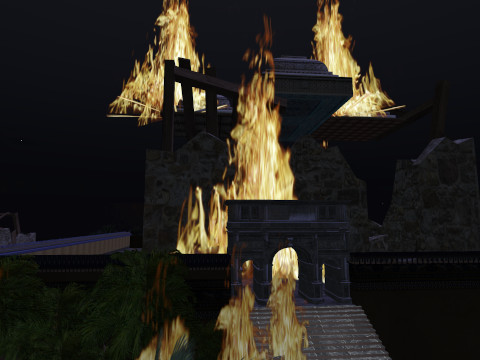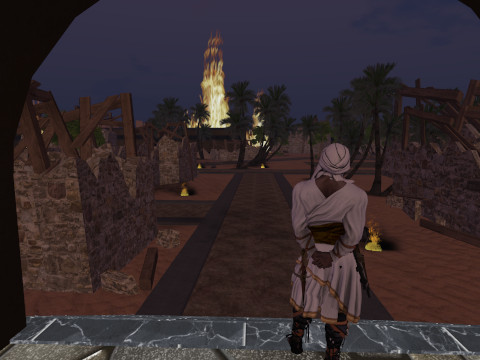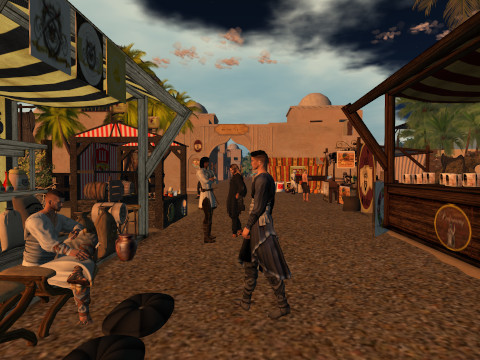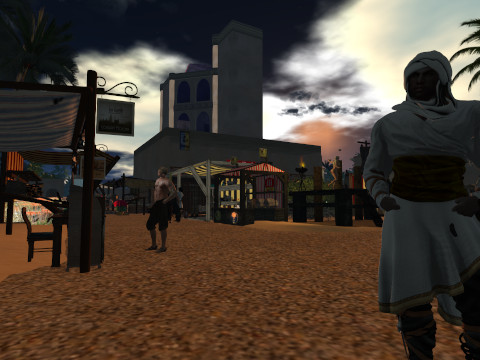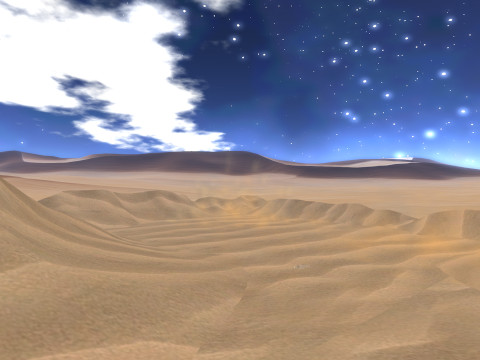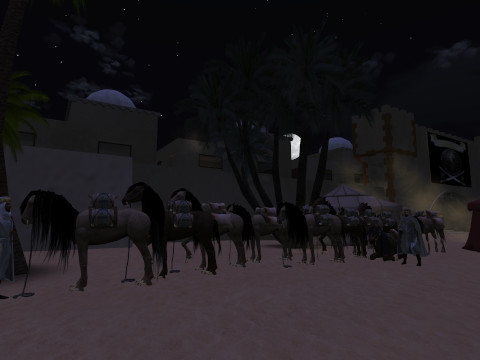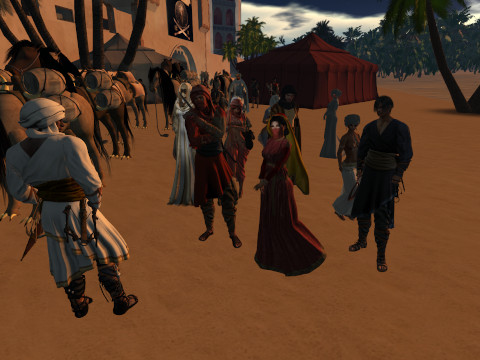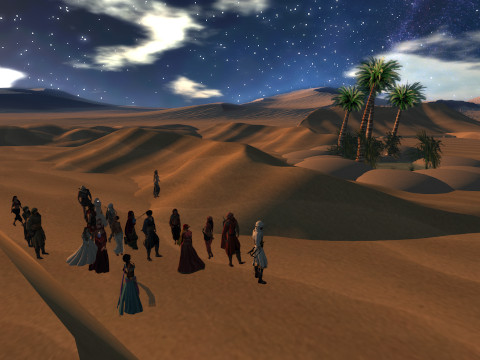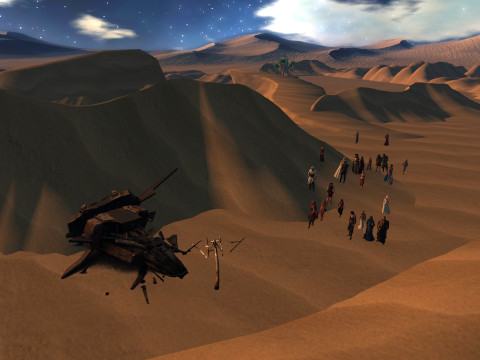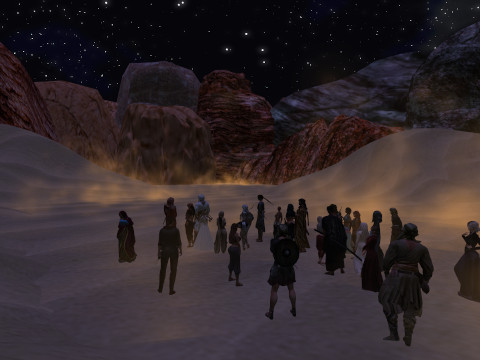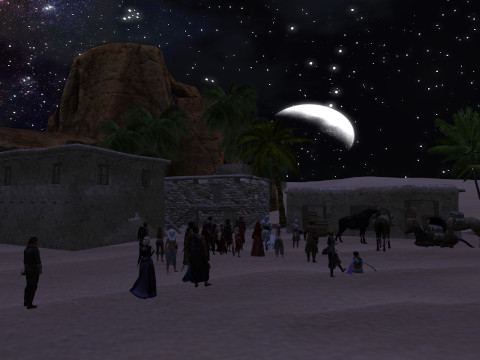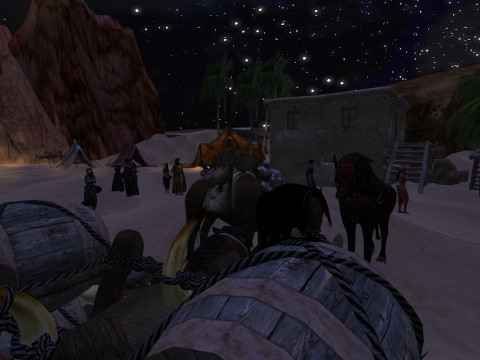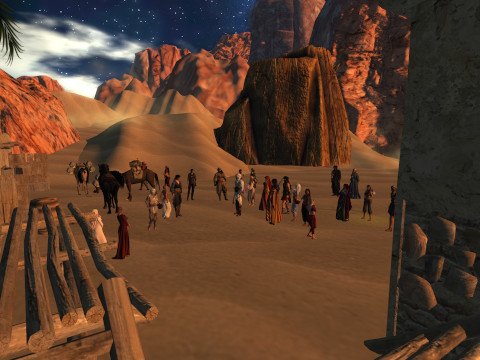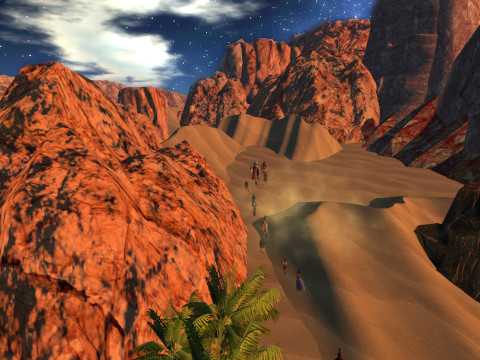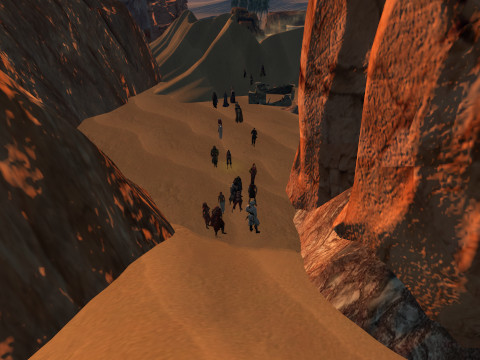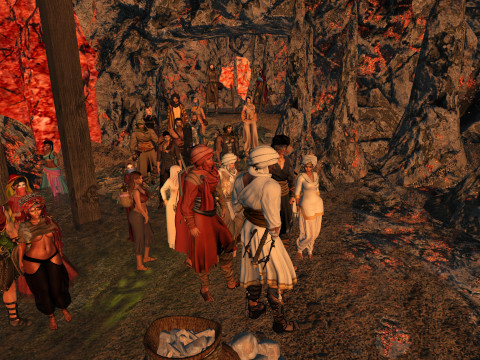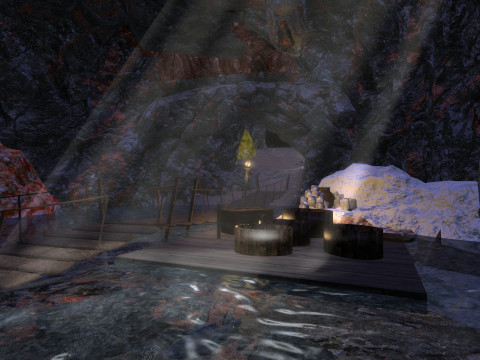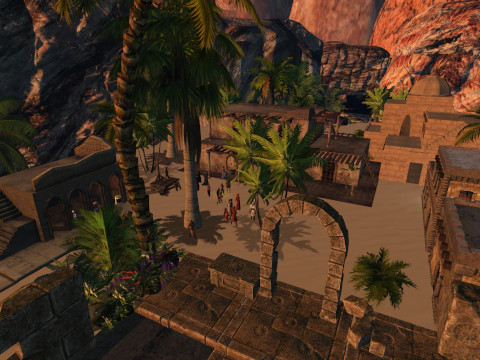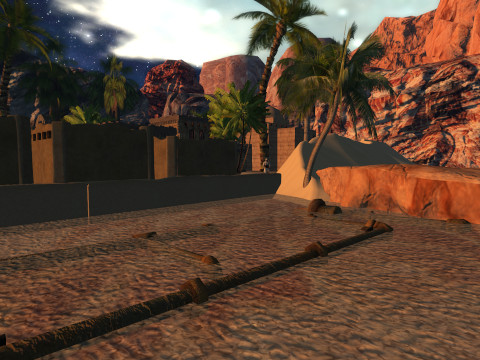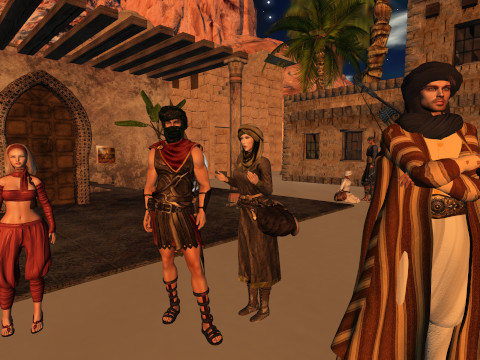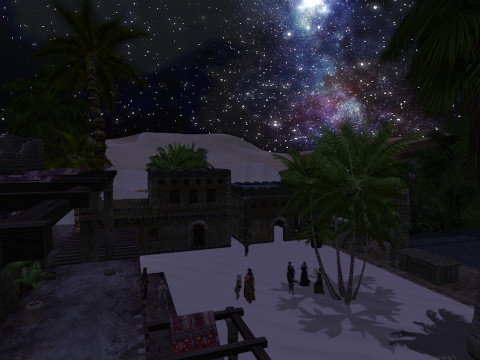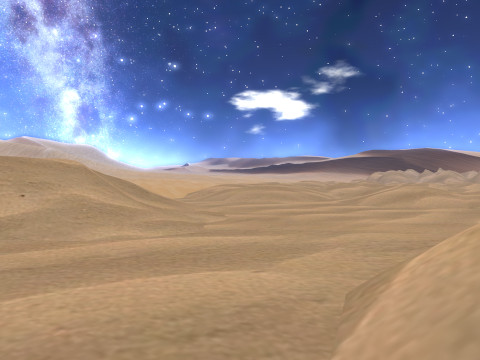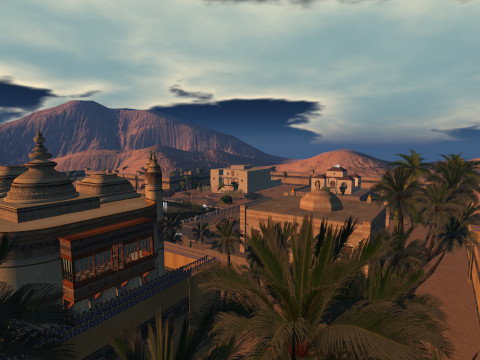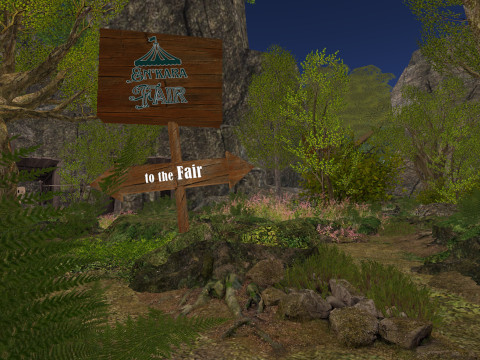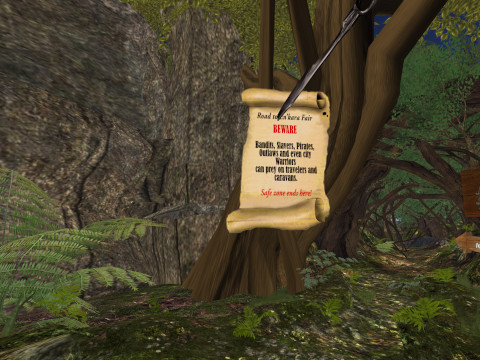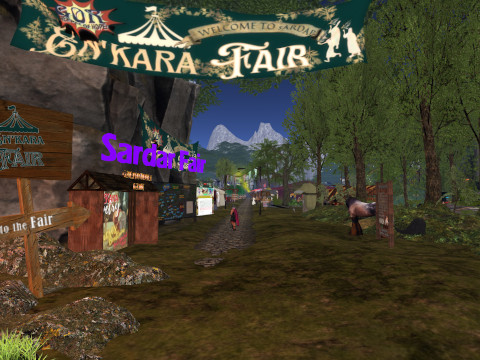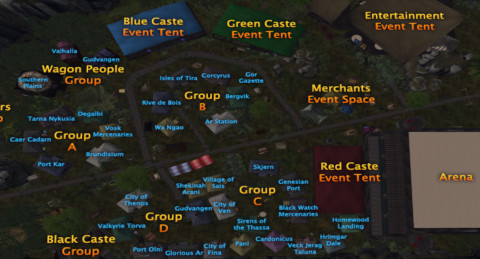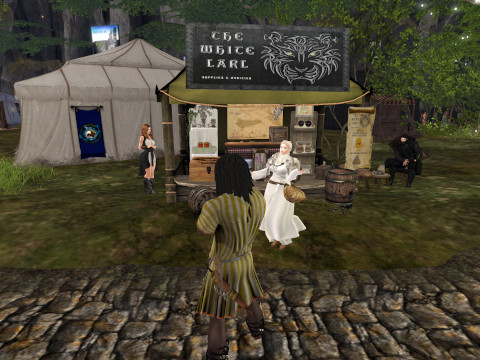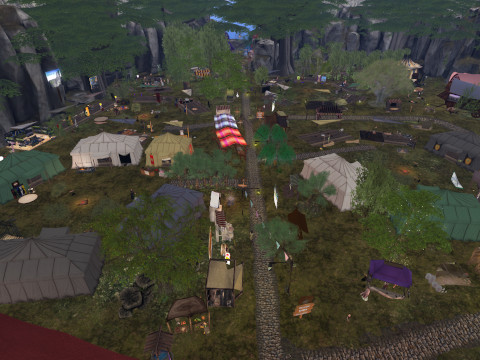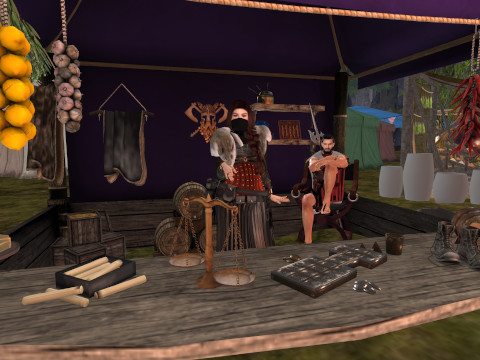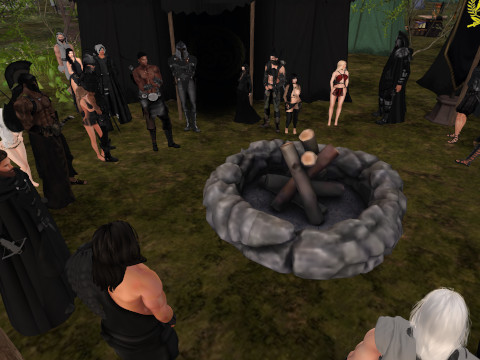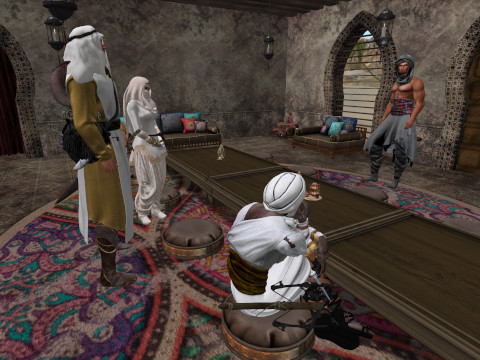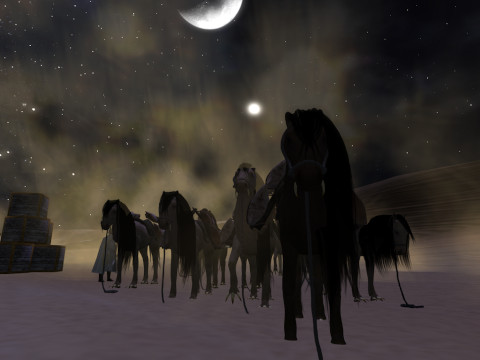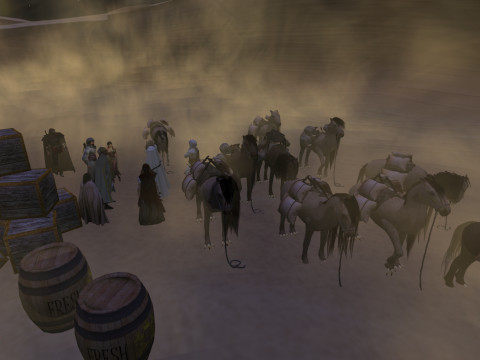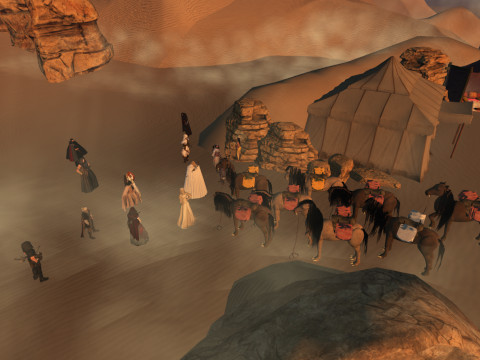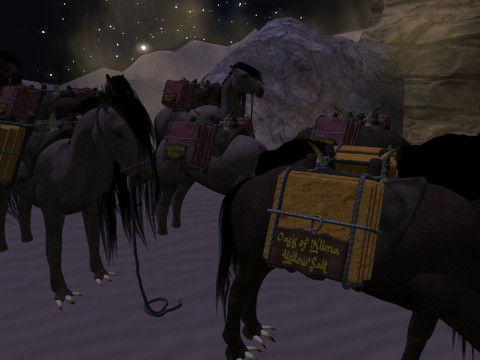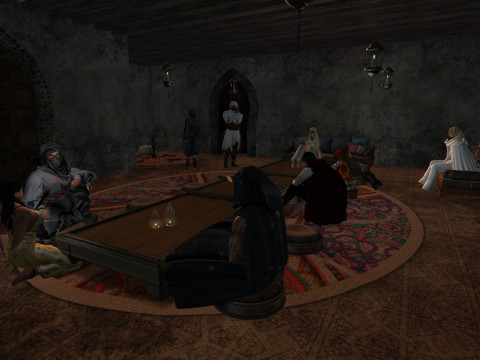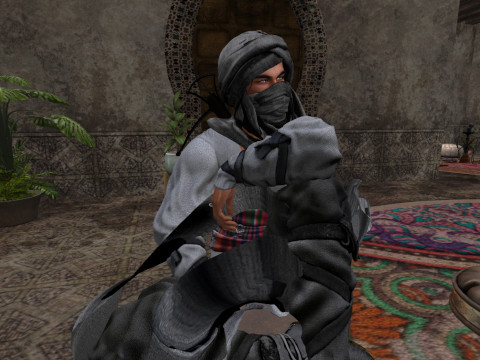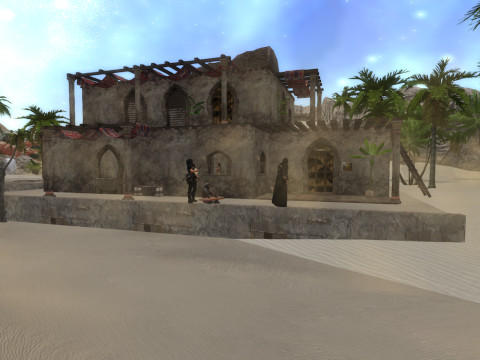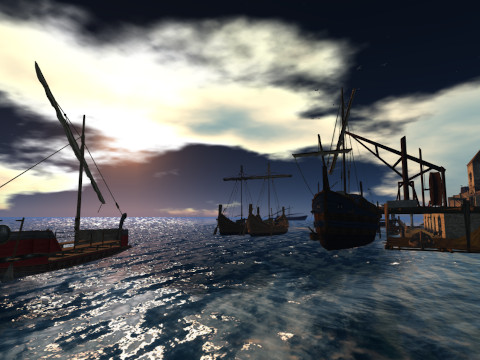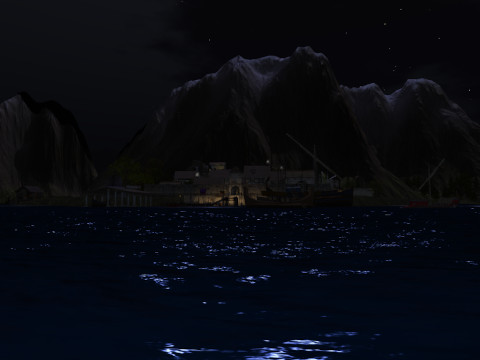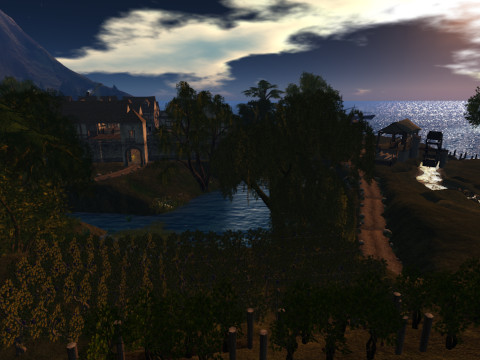Archive for the ‘Southern Trade Alliance (STA)’ Category
End of the grape harvest- Weinfest Halin
Wednesday, October 12th, 2022End of the grape harvest in the village of Halin – Ende der Weinlese im Dorf Halin
Beware of the Steeltower!
Tuesday, September 20th, 2022Strong sandstorms destroy the paths to the Oasis of Klima very often. Even the Guards of the Dunes had trouble finding their way. For several months, no salt caravan has arrived from the oasis, There are rumors that entire caravans have even disappeared. The STA leaders had decided to equip an expedition to reach the oasis of Klima. Armed men lead the caravan and scout the terrain.
The caravan to the Oasis of Klima prepares for for the march at the gates of Cartassa. The leaders give final orders.
A guard of the dunes riding a kaiila explores the terrain, as yet no danger seems imminent
After a long march, the steel tower that some caravan leaders had reported about suddenly appears. A spooky being runs towards the caravan and lets out an incomprehensible roar.
The men draw their weapons and prepare for a fight. A second Kur appears behind the first one. The experienced caravan leaders try to placate the Kurri with crates of raw meat. Some run behind the dunes and try to avoid the steel tower.
The Kurri are irritated by the smell of the meat. Everyone run towards the oasis of Klima. The Kurii attack the stragglers, there are some wounded. Luckily nobody gets killed.
The wounded are treated in the infirmary of the Oasis of Klima.
Breaking: Oasis of Opals burnt down
Sunday, August 21st, 2022The Oasis of Opals was completely destroyed by a fire last night. News of the fire reached the nearby oases late. The extinguishing work was extremely hampered by a sandstorm. Unfortunately, deaths are to be mourned. There were some injured who were transported to Cartassa where they were treated.
Many thanks to everyone who helped!
Cartassa Merchant Fair
Friday, July 29th, 2022Impressions from the Cartassa Merchant Fair (July 2022)
The most remote place on Gor – We marched there!
Tuesday, July 5th, 2022Survival in the Tahari can be very difficult, if not impossible, unless one is cognizant of the ways of the desert, unless one properly understands the intricacies of desert survival. As an initial issue, this region can be extremely hot. When the sun beats down upon the sand, the surface can attain a temperature of 175 degrees Fahrenheit. Though shaded areas can offer some respite, the temperature can still sometimes reach as high as 140 degrees. But, what many may not realize is that only a foot below the surface the temperature can drop by as much as 50 degrees.
[Leader of the caravan] …raises his hand in a Gorean salute: welcome to Cartassa, wanderers and merchants and friends of the Southern Trade Alliance: this caravan will leave for the exchange point of the Oasis of Klima very soon.
[Leader of the caravan] …recognizes a few palm trees on the horizon, it looks like there is water there, he mumbles to himself in astonishment: That has never been here or am I hallucinating? He waves to the group that someone should see if it really is water there…
[Leader of the caravan] …behind a dune he recognizes a strange thing, he raises his hand to get everyone’s attention: Stop! Armed men twith me! We need to examine that… thing… he shakes his head in disbelief: Have you seen, or heard aught, of a tower of steel?
Leader of the caravan] …stops and points with his had to the steel tower: Move! Move! We should move away. This is a very dangerious area, ignore that steel tower! I have been told that men disappeared here in the past!
Leader of the caravan] …holds his palm over his eyes again and scans the horizon, then he points straight ahead, a smile on his face: We are not far from Exchange Point from the oasis, I recognize the rocks, it’s only a day from there until you are all safe and can rest and have enough water, as they say, you don’t need to know the name of the oasis..
Leader of the caravan] …”Kaiila and other animals you may use to ride are not allowed in the oasis from many reasons,” He points to the crest of the dune that everyone is just climbing over to have.
Leader of the caravan] …We need to go to Vask, barbarians call it “South”, I recognize that area now…
Leader of the caravan] …you have enterered the caves and salt mines of the Oasis of Klima, caution! dont fall down…
The locations of the pits, such as those at Klima, are little known, and, to protect the resource, are kept secret by mine agents and merchants.
Thank you for everyone who participated the very interesting roleplay! (Many thanks to the 24 roleplayers of Belnend!)
Oasis of Opals
Tuesday, July 5th, 2022Oasis of Opals, Tahari
En’Kara Fair – First Impressions
Saturday, March 12th, 2022The Fair of En’Kara – Schedule [2022]
“It was now the month of the vernal equinox on Gor, called En’Kara, or the First Kara. The full expression in En’Kara-Lar-Torvis, which means, rather literally, The First Turning of the Central Fire.”
Book 2, Outlaw of Gor, page 178
“I saw the pavilions of the Fair of En’Kara, or the Fair of the First Turning.”
Book 2, Outlaw of Gor, page 179
“It was not far to the fair of En’Kara, one of the four great fairs held in the shadow of the Sardar during the Gorean year, and I soon walked slowly down the long central avenue between the tents, the booths and stalls, the pavilions and stockades of the fair, toward the high, brassbound timber gate, formed of black logs, beyond which lies the Sardar itself, the sanctuary of this world’s gods, known to the men below the mountains, the mortals, only as Priest-Kings.”
Book 3, Priest-Kings of Gor, page 8
“The results of these raids might be returned to Treve or sold, perhaps even at the Fair of En’Kara, or another of the four great Sardar Fairs,”
Book 3, Priest-Kings of Gor, page 63
“It was now near the end of the first passage hand, that the following En’Kara, in which occurs the Spring Equinox. The Spring Equinox, in Port Kar as well as in most other Gorean cities, marks the New Year. In the chronology of Ar it was now the year 10,120.”
Book 6, Raiders of Gor, page 126
“They were then transported overland in slave wagons to the Sardar, where they were sold at the great spring fair of En’Kara.”
Book 7, Captive of Gor, page 234
“It was said that Scormus of Ar and Centius of Cos would sometime meet at the great fair of En’Kara, in the shadow of the Sardar.”
Book 8, Hunters of Gor, page 148
“‘Besides,’ I said, ‘it is En’Kara.’
‘So?’ asked Samos.
‘It is time for the Kaissa matches at the Fair of En’Kara, at the Sardar,’ I said. I found it hard to think that this was not on the mind of Samos. ‘Centius of Cos,’ I said, ‘is defending his title against Scormus of Ar.’ ”
Book 12, Beasts of Gor, pages 33 – 34
” ‘Make way! Make way!’ laughed the brawny young fellow. He had a naked girl over his shoulder, bound hand and foot. He had won her in Girl Catch, in a contest to decide a trade dispute between two small cities, Ven and Ram, the former a river port on the Vosk, the second noted for its copper mining, lying southeast of Tharna. In the contest a hundred young men of each city, and a hundred young women, the most beautiful in each city, participate. The object of the game is to secure the women of the enemy. Weapons are not permitted. The contest takes place in an area outside the perimeters of the great fair, for in it slaves are made. The area is enclosed by a low wooden wall, and spectators observe. When a male is forced beyond the wall he is removed from the competition and may not, upon pain of death, re-enter the area for the duration of the contest. When a girl is taken she is bound hand and foot and thrown to a girl pit, of which there are two, one in each city’s end of the “field.” These pits are circular, marked off with a small wooden fence, sand-bottomed, and sunk some two feet below the surface of the “field.” If she cannot free herself she counts as a catch. The object of the male is to remove his opponents from the field and capture the girls of the other city. The object of the girl, of course, is to elude capture.
‘Make way!’ he called. ‘Make way!’ I, with others in the crowd, stepped aside.
Both the young men and women wear tunics in this sport. The tunics of the young women are cut briefly, to better reveal their charms. The young man wears binding fiber about his left wrist, with which to secure prizes. The young women, who are free, if the rules permit, as they sometimes do not, commonly wear masks, that their modesty be less grievously compromised by the brevity of their costume. Should the girl be caught, however, her mask is removed. The tunics of the girls are not removed, however, except those of the girls of the losing city, when the match has ended and the winner decided. The win is determined when the young men of one city, or those left on the field, have secured the full hundred of the women of the “enemy.” A woman once bound and thrown to the girl pit, incidentally, may not be fetched forth by the young men of her city, except at the end of the match, and on the condition that they have proved victorious. The captured women of the victorious city at the conclusion of the contest are of course released; they are robed and honored; the girls of the losing city, of course, are simply stripped and made slaves. This may seem a cruel sport but some regard it as superior to a war; surely it is cleaner and there is less loss of life; this method of settling disputes, incidentally, is not used if it is felt that honor is somehow involved in the disagreement. Honor is important to Goreans, in a way that those of Earth might find hard to understand; for example, those of Earth find it natural that men should go to war over matters of gold and riches, but not honor; the Gorean, contrariwise, is more willing to submit matters of honor to the adjudication of steel than he is matters of riches and gold; there is a simple explanation for this; honor is more important to him. Strangely the girls of the cities are eager to participate in this sport. Doubtless each believes her standard will be victorious and she will return in honor to her city.
The young man brushed past me. The girl’s hair was still bound, knotted, on her head; it had not yet even been loosened, as that of a slave girl. Looped about her neck, locked, was a slender, common, gray-steel slave collar. He had wired a tag to it, that she might be identified as his. She had been of Ram, probably of high caste, given the quality of her beauty. She would now be slave in the river port of Ven. The man appeared to be a young bargeman. Her lips were delicate and beautiful. They would kiss him well.
I watched him press on through the crowds, toward the looming palisade which ringed the Sardar Mountains, black and snow-capped, behind it.
The numbers in the game are set at a hundred young men and a hundred young women, in order that there be a young woman for each winning male.
This was the first year, incidentally, in which masks had been permitted to the young women in some of these contests. The masks, however, had been brief and feminine. They concealed little and did little more than to excite the men and stimulate them to the beauty’s pursuit, culminating in her rude assault, capture and unmasking. Still I suspected the innovation, next year, would be dropped. It is easier to gamble on the taking of given girls, and how long they will be at large, if their beauty is better visible to the bettors.
I looked after the young man. He was going to the palisade. There he would climb one of the platforms and, putting the girl on her knees, her ankles and wrists crossed and bound, at his feet, facing the Sardar, he would unbind her hair. Then he would lift her in his arms, hair unbound, before the mountains of the Sardar, rejoicing, and giving thanks to Priest-Kings that she was now his.”
Book 12, Beasts of Gor, pages 41 – 43
“I would stay in one of the public tents tonight. For five copper tarsks one may rent furs and a place in the tent. It is expensive, but it is, after all, En’Kara and the time of the fair. In such tents it is not unusual for peasants to lie crowded, side by side, with captains and merchants. During En’Kara, at the Fair, many of the distinctions among men and castes are forgotten.
Unfortunately meals are not served in the tents. For the price it seems one should banquet. This lack, however, is supplied by numerous public kitchens and tables. These are scattered throughout the district of the fair. Also there are vendors.
I took my place at the end of one of the long lines, that which I conjectured to be the shortest.
There are some compensations in the public tents, however. One may have paga and wines there. These are served by slave girls, whose comforts and uses are also included within the price of the lodging.
‘Soup! Soup!’ called a man.
‘Soup!’ I called, raising my hand. I purchased from him, for a copper tarsk, a bowl of soup, thick with shreds of hot bosk and porous chunks of boiled sul.”
Book 12, Beasts of Gor, pages 50 – 51
-speaking of Kaissa-
“Some regarded winning the city championship of Ar as tantamount to victory at the Fair of En’Kara.”
Book 12, Beasts of Gor, page 87
“One of their major markets, to which they generally arrange for the shipment of girls overland, is the Sardar Fairs, in particular that of En’Kara, which is the most extensive and finest.”
Book 13, Explorers of Gor, page 115
“The fair of En’Kara occurs in the spring. It is the first fair in the annual cycle of the Sardar Fairs, gigantic fairs which take place on the plains lying below the western slopes of the Sardar Mountains. These fairs, and others like them, play an important role in the Gorean culture and economy. They are an important clearing house for ideas and goods, among them female slaves.”
Book 20, Players of Gor, page 8
“Slavers remain active all year on Gor, but the peak seasons for slaving are the spring and early summer. This has to do with such matters as the weather, and the major markets associated with certain feasts and holidays, for example, the Love Feast in Ar, which occurs in the late summer, occupying the full five days of the Fifth Passage Hand. Also, during these seasons, of course, occur the great markets associated with the fairs of En’Kara and En’Var. These are the two major seasonal markets on Gor, exceeding all others in the volume of women processed.”
Book 20, Players of Gor, page 13
” ‘She is one of a lot of one hundred,’ said Samos. ‘They are to be sold at the fair of En’Kara.’ ”
Book 20, Players of Gor, page 37
” ‘Under the conditions you propose,’ I said, ‘I would not accept a win from you, if you were Centius of Cos.’ Centius of Cos was perhaps the finest player on Gor. He had been the champion at the En’Kara tournaments three out of the last five years. In one of those years, 10,127 C.A., he had chosen not to compete, giving the time to study. In that year the champion had been Terence of Turia. In 10,128 C.A. Centius had returned but was defeated by Ajax of Ti, of the Salerian Confederation, who had overcome Terence in the semifinals. In 10,129 C.A., last En’Kara, Centius had decisively bested Ajax and recovered the championship.”
Book 20, Players of Gor, page 56
” ‘The Fair of En’Kara is the greatest of all the fairs,’ he said. ‘It comes but once a year. It is important to us! We need every tarsk-bit we can make here.’ ”
Book 20, Players of Gor, page 160
” ‘This is the Fair of En’Kara,’ he said. ‘There are thousands of girls for sale here, in the care of hundreds of owners.’ ”
Book 20, Players of Gor, page 163
“There are four such fairs, administered by the merchants, held annually in the vicinity of the Sardar, those of En’Kara, En’Var, Se’Kara and Se’Var.”
Book 20, Players of Gor, page 169
“The reform of chronology is proposed by a small party from among the caste of scribes almost every year at the Fair of En’Kara, near the Sardar, but their proposals, sensible as they might seem, are seldom greeted with either interest or enthusiasm, even by the scribes.”
Book 23, Renegades of Gor, page 347
“‘What is the 97th Aphorism in the Codes?’ inquired Labienus.
‘My scrolls may not be those of Ar,’ I said. To be sure, the scrolls should be, at least among the high cities, in virtue of conventions held at the Sardar Fairs, particularly the Fair of En’Kara, much in agreement.”
Book 24, Vagabonds of Gor, page 305
A Mysterious Man
Sunday, February 13th, 2022Three merchants from the Oasis of Four Palms arrived at the Oasis of Klima after a grueling trek. In the tavern they met a mysterious man who did not want to reveal his name. He said he was a simple-minded salt merchant…
The March to the Oasis of Klima
Tuesday, October 12th, 2021We made the march to Klima! The Salt Ubar administers and controls the salt districts primarily by regulating access to the districts, checking the papers and credentials of merchants, inspecting caravans, keeping records of the commerce, etc. The Salt Ubar’s men are customarily veiled as their allegiance is supposed to be to no tribe but to the protection of salt.
The Southern Trade Alliance (STA) hold a meeting in the Oasis of Klima guarded by heavily armed men who were veiled or masked. The membership of several cities and oasis had been confirmed by the assembly. The Salt Ubar was present and his deputy too.
[Thank you for everyone who participated the very interesting roleplay and thank you Sнaι’leιa Ͼeleѕтe Ḣuѕzan (shaileia) for the awesome and outstanding sim!]
Kargash
Saturday, September 4th, 2021The harbour of Kargash and the vineyard. Kargash is a town located on the western coast of Gor between Turia and the Anango Island. The town is a member of the Southern Trade Alliance (STA) and the main port for trade with northern Gor.
